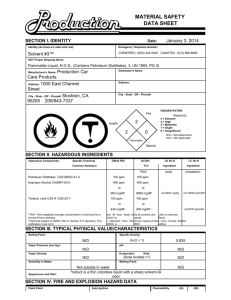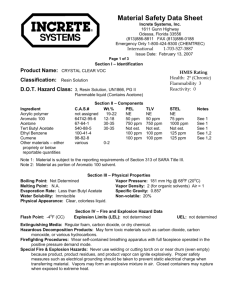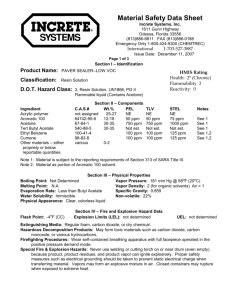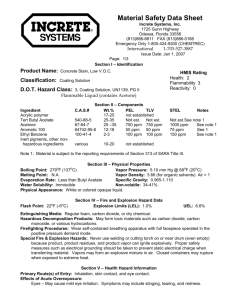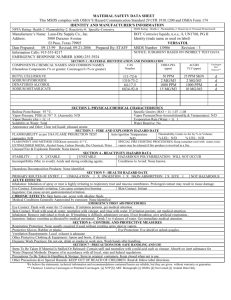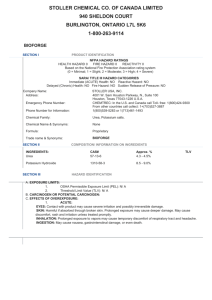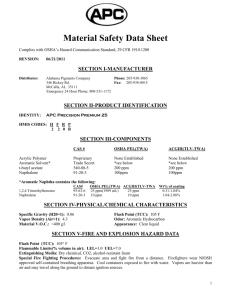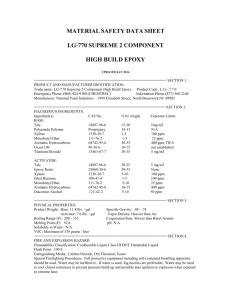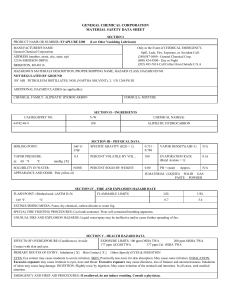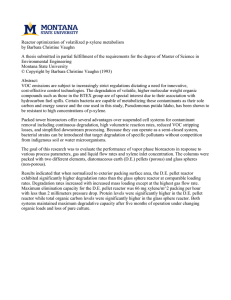Clear Seal 400 - E & A Supply Corp
advertisement
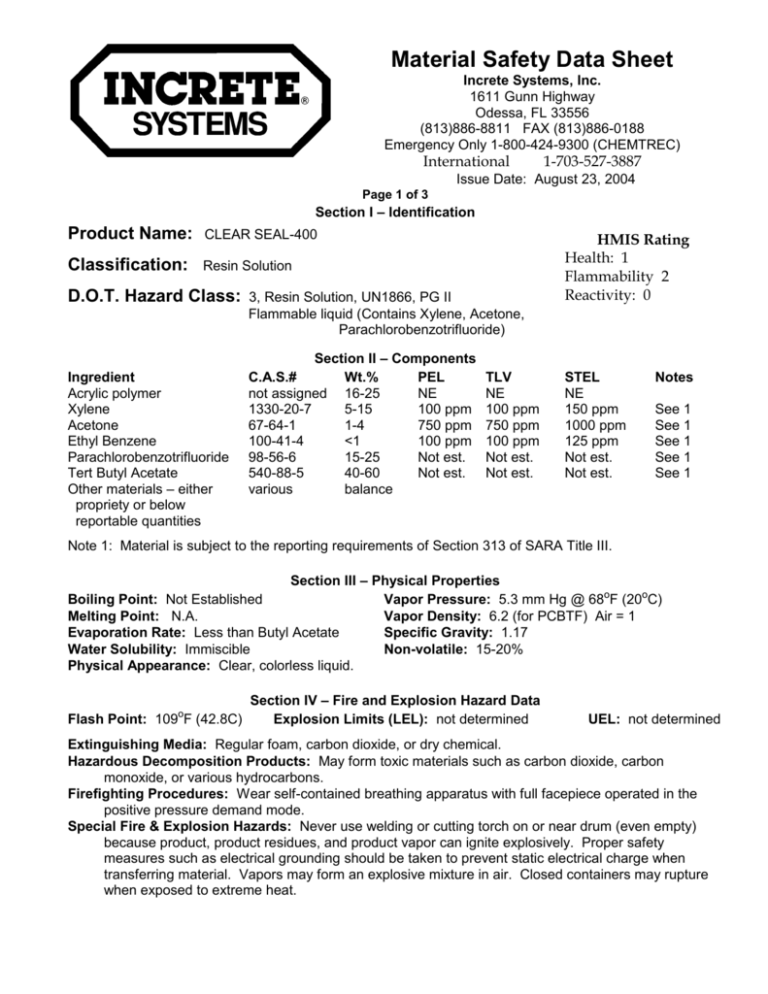
Material Safety Data Sheet Increte Systems, Inc. 1611 Gunn Highway Odessa, FL 33556 (813)886-8811 FAX (813)886-0188 Emergency Only 1-800-424-9300 (CHEMTREC) International 1-703-527-3887 Issue Date: August 23, 2004 Page 1 of 3 Section I – Identification Product Name: CLEAR SEAL-400 Classification: Resin Solution D.O.T. Hazard Class: Ingredient Acrylic polymer Xylene Acetone Ethyl Benzene Parachlorobenzotrifluoride Tert Butyl Acetate Other materials – either propriety or below reportable quantities 3, Resin Solution, UN1866, PG II Flammable liquid (Contains Xylene, Acetone, Parachlorobenzotrifluoride) Section II – Components C.A.S.# Wt.% PEL not assigned 16-25 NE 1330-20-7 5-15 100 ppm 67-64-1 1-4 750 ppm 100-41-4 <1 100 ppm 98-56-6 15-25 Not est. 540-88-5 40-60 Not est. various balance TLV NE 100 ppm 750 ppm 100 ppm Not est. Not est. HMIS Rating Health: 1 Flammability 2 Reactivity: 0 STEL NE 150 ppm 1000 ppm 125 ppm Not est. Not est. Notes See 1 See 1 See 1 See 1 See 1 Note 1: Material is subject to the reporting requirements of Section 313 of SARA Title III. Section III – Physical Properties Boiling Point: Not Established Vapor Pressure: 5.3 mm Hg @ 68oF (20oC) Melting Point: N.A. Vapor Density: 6.2 (for PCBTF) Air = 1 Evaporation Rate: Less than Butyl Acetate Specific Gravity: 1.17 Water Solubility: Immiscible Non-volatile: 15-20% Physical Appearance: Clear, colorless liquid. Section IV – Fire and Explosion Hazard Data Flash Point: 109 F (42.8C) Explosion Limits (LEL): not determined o UEL: not determined Extinguishing Media: Regular foam, carbon dioxide, or dry chemical. Hazardous Decomposition Products: May form toxic materials such as carbon dioxide, carbon monoxide, or various hydrocarbons. Firefighting Procedures: Wear self-contained breathing apparatus with full facepiece operated in the positive pressure demand mode. Special Fire & Explosion Hazards: Never use welding or cutting torch on or near drum (even empty) because product, product residues, and product vapor can ignite explosively. Proper safety measures such as electrical grounding should be taken to prevent static electrical charge when transferring material. Vapors may form an explosive mixture in air. Closed containers may rupture when exposed to extreme heat. CLEAR SEAL-400 MSDS, Page 2 of 3 Section V – Health Hazard Information Primary Route(s) of Entry: Inhalation, skin contact, and eye contact. Effects of Acute Overexposure: Eyes – May cause mild eye irritation. Symptoms may include stinging, tearing, and redness. Skin – Exposure can cause defatting of tissue leading to dryness, redness, burning and cracking. Pre-existing skin conditions can be aggravated by exposure to this product. Respiratory – Overexposure can cause difficulty with breathing and shortness of breath as well as irritation to the nose, throat, and respiratory tract. Extreme exposure will also cause central nervous system depression with the possibility of dizziness, drowsiness, nausea, headache, and unconsciousness. Pre-existing respiratory conditions can be aggravated by exposure to this product. Ingestion – Single dose oral toxicity is low, and unlikely to occur with normal handling. Symptoms will include gastrointestinal irritation (nausea, vomiting, diarrhea), and central nervous system depression (dizziness, drowsiness, nausea, headache, unconsciousness). First Aid: Eyes – Flush gently with water. If symptoms persist or vision is impaired, seek medical attention. Skin – Remove contaminated clothing, flush exposed area with large amounts of water. If skin is damaged or symptoms of irritation persist, seek medical attention. Respiratory – Remove individual to fresh air immediately. If unconscious, begin artificial respiration. Seek medical attention. Ingestion – DO NOT induce vomiting. Keep individual warm and quiet. If symptoms include unconsciousness or drowsiness, place individual on his left side with his head down. Seek medical attention. Effects of Chronic Overexposure: No components of this material have been identified as carcinogenic. Intentional misuse of this product by deliberate inhalation has been shown to cause liver, kidney, brain damage and death. Toluene and xylene (two components of this material) have been shown to cause fetal defects in laboratory animal studies, however the relevance of these findings to humans is uncertain. Repeated and prolonged overexposure to products similar to this material has been associated with cardiac arrhythmia and permanent brain and nervous system damage. Section VI – Chemical Reactivity Stability: Material is stable. Hazardous Polymerization: Will not occur. Incompatibility: Avoid strong oxidizing agents. Conditions to Avoid: Warm storage and ignition sources. Hazardous Decomposition Products: Incomplete combustion produces carbon monoxide and carbon dioxide. Section VII – Spill Procedures Small Spill: Absorb spilled product onto inert absorbent material. Large Spill: Remove all sources of ignition, ventilate area. Dike area to prevent material from entering sewer or water supplies. Wear protective equipment during cleanup. Absorb spilled product with an inert absorbent material (sawdust, vermiculite, sand, etc.), and place in closed containers. This material contains the following ingredients which, if spilled or released in quantities equal to or greater than the Reportable Quantity (RQ), are subject to the reporting requirements of CERCLA and/or SARA (40 CFR Parts 302, 355): Xylene RQ Value = 1000 pounds Ethyl Benzene RQ Value = 1000 pounds CLEAR SEAL-400 MSDS, Page 3 of 3 Waste Disposal Method: Dispose of material in a manner consistent with local, state and federal law. For further information, contact your state or local waste agency or the United States Environmental Protection Agency's RCRA hotline (1-800-424-9346). Section VIII – Special Protection Information Respiratory Protection: When PEL or TLV limits are exceeded, use an approved self-contained breathing apparatus with full face-piece or use organic vapor canister mask. Ventilation: Provide sufficient mechanical ventilation to maintain exposure levels below TLV's. Gloves: Chemical-resistant nitrile, neoprene or rubber gloves required. Eye Protection: Wear face-shield or chemically-resistant goggles. Other Protective Equipment: Wear appropriate work clothing to prevent skin contact. Wash before reuse. Eye wash station and safety shower should be available. Section IX – Special Precautions Handling and Storing: Avoid prolonged or repeated inhalation of heated vapors or spray mists. Keep away from heat or open flame. Avoid prolonged or repeated skin contact. Containers of this material may be hazardous when emptied. Treat empty containers with the same hazard precautions given in this data sheet. Section X – Supplemental Information SARA Title III – Section 313 Listed Ingredients: The following ingredients in this product are subject to the reporting requirements of Section 313 of SARA and 40 CFR 372 (see Section II of this document for percentages of ingredients: xylene (1330-20-7) acetone (67-64-1) ethyl benzene (100-41-4) parachlorobenzotrifluoride (98-56-6) Tert Butyl Acetate (540-88-5) SARA Title III – Section 311/312 Hazard Classifications. This product is rated as a Fire Hazard, an Immediate (acute) Health Hazard, and a Delayed (chronic) Health Hazard. This information is provided in good faith and is correct to the best knowledge of Increte Chemical Company, Inc. Increte Chemical Co., Inc. makes no representation as to its completeness or accuracy. Customers are encouraged to make their own determination as to the suitability of this product for their purpose prior to use. Increte Chemical Co., Inc. disclaims responsibility for damages of any kind resulting from the use of this information. No warranty of merchantability, fitness for use, or any other warranty is expressed or is to be implied regarding the accuracy of these data.
